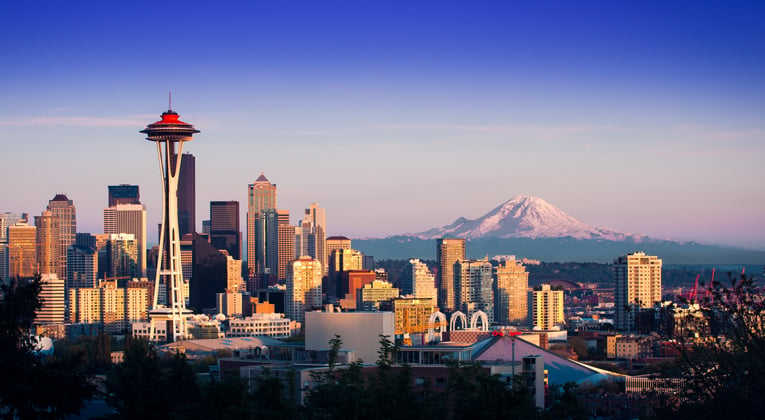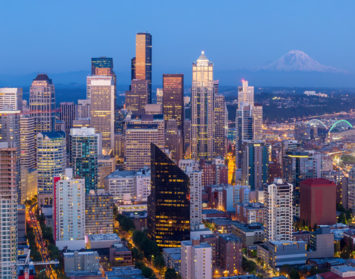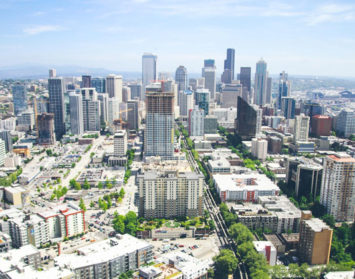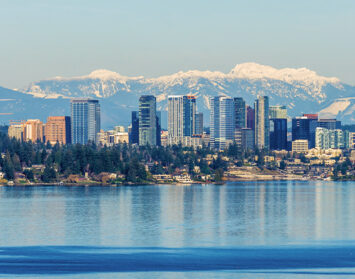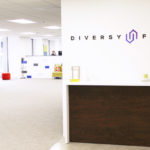By Gavin Curtis
There are a number of compelling reasons why states and cities become hubs for certain industries and companies.
Each year, the CNBC network compiles a Top States for Business list, ranking each of the 50 in 10 key areas: Cost of Living, Access to Capital, Business Friendliness, Education, Technology and Innovation, Economy, Quality of Life, Cost of Doing Business, Infrastructure and Workforce.
In their 2018 list, Washington ranked second overall, finishing slightly behind Texas, following their #1 ranking in 2017. At the core of the Evergreen state’s flourishing business opportunity climate is the Greater Seattle metro, and its dynamic and innovative culture and entrepreneurial ecosystem.
The iconic brands prospering in the region are household names: Amazon, Microsoft, Google, Facebook and Apple, along with T-Mobile, PACCAR, Starbucks, Costco, Boeing, Expedia, Weyerhaeuser, Nordstrom and Expeditors.
Greater Seattle boasts economic diversification, and while the vertical may be aerospace, social media, retail, consumer electronics, search advertising, web services and a host of other commercial endeavors, powering these vibrant businesses is the engine of technology and innovation.
Silicon Valley may garner the attention, and Austin the fanfare, but Greater Seattle receives the accolades. According to a 2018 GeekWire article, the region captured the #1 position as the fastest expanding technology center.
In 2016 and 2017 alone, the region added nearly 34,000 technology jobs—a 26 percent pace of growth, which far surpasses its peers.
Companies from Fortune 500 to startups are expanding their operations, requiring world-class talent to compete, and executives know that they can find this expertise in Greater Seattle. According to a Globe St. article, the region possesses the country’s most educated workforce, with 63 percent of individuals over 25 holding at least a bachelor’s degree. This deep pool of labor talent pushed Seattle to the #2 spot in 2018 for technology talent, trailing behind San Francisco.
Much of this intellectual capital is homegrown from the metro’s quality colleges and universities, however, company demand for talent has accelerated migration to Seattle from New York City, Boston, Chicago, the Bay Area and even internationally.
Individuals in engineering, programming, software design and other technology professions choose Seattle because of its quality of life, affordability, housing costs and outlook for employment. As an example, a Globe St. article reports that “comparing the annual average apartment rent with the annual average tech-worker salary, Seattle’s rent-to-wage ratio for tech employees is 17.5 percent, well below similar markets and the affordability standard of 30 percent of income to housing.”
Similarly, companies choose Greater Seattle for its cost of doing business, both from a wage perspective, but also from the vantage point of commercial real estate. According to National Real Estate Investor, certain prime addresses in Boston fetch office rents of $68.00 per square foot, $119.00 in Silicon Valley and $78.00 in Los Angeles. As for Seattle office space, tenants such as Amazon and Microsoft can pick up room for on average $62.00 per square foot.
Another critical differentiator—Washington’s zero income tax rate, one of only seven states with such a policy.
Greater Seattle’s technology environment is energized, and companies and individuals want to be in on the action. Cloud computing, artificial intelligence and machine leaning are all booming, with firms making transformational advancements.
Globe St. indicates that Greater Seattle’s “tech labor concentration—or the percentage of total employment—amounts to 145,140 individuals, or 8.8 percent of its total employment, compared to the national average of 3.5 percent.”
Developers are attuned to this robust growth narrative and have nearly seven million square feet of office space currently under construction. This on top of the 12 million square feet delivered from 2015-2017.
The region’s technology success is a story of the perfect combination of talent, business demand and cost. Greater Seattle’s technology footprint is world-renowned because business, community and government leaders have created a best-in-class economic development architecture, and the state’s consecutive top two CNBC rankings, amongst countless other rankings prove this.
It is worth mentioning that the economic gains and dynamic technology cluster of the metro do not occur in a vacuum. Sound pro-business policies engender a robust growth environment, and companies respond accordingly with capital investment and hiring. In this context, a recent proposal by Electeds to institute a $275 “Head Count Tax” on business employment runs counter to the continuing development of a dynamic commercial climate. The Seattle City Council passed the ordinance in 2018, only to repeal it a month later. This is sound governance, which offers companies and entrepreneurs favorable conditions to expand and flourish.
Beyond the regulatory architecture, Washington and Greater Seattle have room to improve in areas such as infrastructure, and as these projects come to fruition, there is tremendous opportunity for ongoing growth of the region’s economy and its technology and innovation hub.
Gavin Curtis is an executive vice president at Hughes Marino, a global corporate real estate advisory firm that exclusively represents tenants and buyers. Contact Gavin at 1-844-662-6635 or gavin@hughesmarino.com to learn more.

